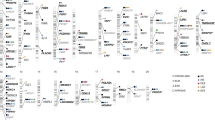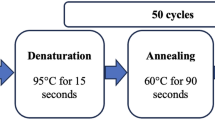Abstract
Genetic risk scores (GRS), summing up the total effect of several single-nucleotide polymorphisms (SNPs) in genes associated with either coronary risk or cardiovascular risk factors, have been tested for association with ischemic stroke with conflicting results. Recently an association was found between a GRS based on 29 SNPs discovered by genome-wide association studies and hypertension. The aim of our study was to investigate the possible association of the same GRS with ischemic stroke on top of other ‘traditional risk factors’, also testing its potential improvement in indices of discrimination and reclassification, in a Swedish case–control study. Twenty-nine SNPs were genotyped in 3677 stroke cases and 2415 controls included in the Lund Stroke Register (LSR), the Malmö Diet and Cancer (MDC) study and the Sahlgrenska Academy Study on Ischemic Stroke (SAHLSIS). The analysis was conducted in the combined sample, and separately for the three studies. After adjustment for hypertension, diabetes mellitus and smoking habits, the GRS was associated with ischemic stroke in the combined sample (OR (95% CI) 1.086 (1.029–1.147) per SD increase in the GRS P=0.003) with similar trends in all three samples: LSR (1.050 (0.967–1.140); P=0.25), MDC (1.168 (1.060–1.288); P=0.002) and SAHLSIS (1.124 (0.997–1.267); P=0.055). Measures of risk discrimination and reclassification improved marginally using the GRS. A blood pressure GRS is independently associated with ischemic stroke risk in three Swedish case–control studies, however, the effect size is low and adds marginally to prediction of stroke on top of traditional risk factors including hypertension.
Similar content being viewed by others
Log in or create a free account to read this content
Gain free access to this article, as well as selected content from this journal and more on nature.com
or
Accession codes
References
Feigin VL, Lawes CM, Bennett DA, Barker-Collo SL, Parag V : Worldwide stroke incidence and early case fatality reported in 56 population-based studies: a systematic review. Lancet Neurol 2009; 8: 355–369.
Fava C, Montagnana M, Guidi GC, Melander O : From circulating biomarkers to genomics and imaging in the prediction of cardiovascular events in the general population. Ann Med 2011; 44: 433–447.
Traylor M, Farrall M, Holliday EG et al. Genetic risk factors for ischaemic stroke and its subtypes (the METASTROKE collaboration): a meta-analysis of genome-wide association studies. Lancet Neurol 2012; 11: 951–962.
Bellenguez C, Bevan S, Gschwendtner A et al. Genome-wide association study identifies a variant in HDAC9 associated with large vessel ischemic stroke. Nat Genet 2012; 44: 328–333.
Gudbjartsson DF, Holm H, Gretarsdottir S et al. A sequence variant in ZFHX3 on 16q22 associates with atrial fibrillation and ischemic stroke. Nat Genet 2009; 41: 876–878.
Ikram MA, Seshadri S, Bis JC et al. Genomewide association studies of stroke. N Engl J Med 2009; 360: 1718–1728.
Holliday EG, Maguire JM, Evans TJ et al. Common variants at 6p21.1 are associated with large artery atherosclerotic stroke. Nat Genet 2012; 44: 1147–1151.
Flex A, Gaetani E, Papaleo P et al. Proinflammatory genetic profiles in subjects with history of ischemic stroke. Stroke 2004; 35: 2270–2275.
Kathiresan S, Melander O, Anevski D et al. Polymorphisms associated with cholesterol and risk of cardiovascular events. N Engl J Med 2008; 358: 1240–1249.
Paynter NP, Chasman DI, Pare G et al. Association between a literature-based genetic risk score and cardiovascular events in women. JAMA 2010; 303: 631–637.
Ripatti S, Tikkanen E, Orho-Melander M et al. A multilocus genetic risk score for coronary heart disease: case-control and prospective cohort analyses. Lancet 2010; 376: 1393–1400.
Yiannakouris N, Katsoulis M, Dilis V et al. Genetic predisposition to coronary heart disease and stroke using an additive genetic risk score: a population-based study in Greece. Atherosclerosis 2012; 222: 175–179.
Lluis-Ganella C, Subirana I, Lucas G et al. Assessment of the value of a genetic risk score in improving the estimation of coronary risk. Atherosclerosis 2012; 222: 456–463.
Ibrahim-Verbaas CA, Fornage M, Bis JC et al. Predicting stroke through genetic risk functions: the CHARGE Risk Score Project. Stroke 2014; 45: 403–412.
Malik R, Bevan S, Nalls MA et al. Multilocus genetic risk score associates with ischemic stroke in case-control and prospective cohort studies. Stroke 2014; 45: 394–402.
Kearney PM, Whelton M, Reynolds K, Muntner P, Whelton PK, He J : Global burden of hypertension: analysis of worldwide data. Lancet 2005; 365: 217–223.
Vasan RS, Larson MG, Leip EP et al. Impact of high-normal blood pressure on the risk of cardiovascular disease. N Engl J Med 2001; 345: 1291–1297.
Fava C, Burri P, Almgren P, Groop L, Hulthen UL, Melander O : Heritability of ambulatory and office blood pressure phenotypes in Swedish families. J Hypertens 2004; 22: 1717–1721.
Levy D, Ehret GB, Rice K et al. Genome-wide association study of blood pressure and hypertension. Nat Genet 2009; 41: 677–687.
Newton-Cheh C, Johnson T, Gateva V et al. Genome-wide association study identifies eight loci associated with blood pressure. Nat Genet 2009; 41: 666–676.
Ehret GB, Munroe PB, Rice KM et al. Genetic variants in novel pathways influence blood pressure and cardiovascular disease risk. Nature 2011; 478: 103–109.
Fava C, Sjogren M, Montagnana M et al. Prediction of blood pressure changes over time and incidence of hypertension by a genetic risk score in Swedes. Hypertension 2013; 61: 319–326.
Hallstrom B, Jonsson AC, Nerbrand C, Petersen B, Norrving B, Lindgren A : Lund Stroke Register: hospitalization pattern and yield of different screening methods for first-ever stroke. Acta Neurol Scand 2007; 115: 49–54.
Berglund G, Elmstahl S, Janzon L, Larsson SA : The Malmo Diet and Cancer Study. Design and feasibility. J Intern Med 1993; 233: 45–51.
Jood K, Ladenvall C, Rosengren A, Blomstrand C, Jern C : Family history in ischemic stroke before 70 years of age: the Sahlgrenska Academy Study on Ischemic Stroke. Stroke 2005; 36: 1383–1387.
Zia E, Hedblad B, Pessah-Rasmussen H, Berglund G, Janzon L, Engström G : Blood pressure in relation to the incidence of cerebral infarction and intracerebral hemorrhage. Hypertensive hemorrhage: debated nomenclature is still relevant. Stroke 2007; 38: 2681–2685.
Adams HP Jr, Bendixen BH, Kappelle LJ et al. Classification of subtype of acute ischemic stroke. Definitions for use in a multicenter clinical trial. TOAST. Trial of Org 10172 in Acute Stroke Treatment. Stroke 1993; 24: 35–41.
Horne BD, Anderson JL, Carlquist JF et al. Generating genetic risk scores from intermediate phenotypes for use in association studies of clinically significant endpoints. Ann Hum Genet 2005; 69: 176–186.
Hosmer DW, Hosmer T, Le CS, Lemeshow S : A comparison of goodness-of-fit tests for the logistic regression model. Stat Med 1997; 16: 965–980.
Pencina MJ, D'Agostino RB Sr, D'Agostino Jr RB, Vasan RS : Evaluating the added predictive ability of a new marker: from area under the ROC curve to reclassification and beyond. Stat Med 2008; 27: 157–172.
Pencina MJ, D'Agostino Sr RB, Steyerberg EW : Extensions of net reclassification improvement calculations to measure usefulness of new biomarkers. Stat Med 2011; 30: 11–21.
R Development Core Team, R: A language and environment for statistical computing. R Foundation for Statistical Computing, Vienna, Austria. ISBN 3-900051-07-0, URL http://www.R-project.org/. R Foundation for Statistical Computing, Vienna, Austria. 2013.
Havulinna AS, Kettunen J, Ukkola O et al. A blood pressure genetic risk score is a significant predictor of incident cardiovascular events in 32 669 Individuals. Hypertension 2013; 61 (5): 987–994.
Flossmann E, Schulz UG, Rothwell PM : Systematic review of methods and results of studies of the genetic epidemiology of ischemic stroke. Stroke 2004; 35: 212–227.
Dichgans M : Genetics of ischaemic stroke. Lancet Neurol 2007; 6: 149–161.
Touze E, Rothwell PM : Sex differences in heritability of ischemic stroke: a systematic review and meta-analysis. Stroke 2008; 39: 16–23.
Banerjee A, Silver LE, Heneghan C et al. Relative familial clustering of cerebral versus coronary ischemic events. Circ Cardiovasc Genet 2011; 4: 390–396.
Bevan S, Traylor M, Adib-Samii P et al. Genetic heritability of ischemic stroke and the contribution of previously reported candidate gene and genomewide associations. Stroke 2012; 43: 3161–3167.
Padmanabhan S, Melander O, Johnson T et al. Genome-wide association study of blood pressure extremes identifies variant near UMOD associated with hypertension. PLoS Genet 2010; 6: e1001177.
Fava C, Montagnana M, Rosberg L et al. Subjects heterozygous for genetic loss of function of the thiazide-sensitive cotransporter have reduced blood pressure. Hum Mol Genet 2008; 17: 413–418.
Ji W, Foo JN, O'Roak BJ et al. Rare independent mutations in renal salt handling genes contribute to blood pressure variation. Nat Genet 2008; 40: 592–599.
Marjot T, Yadav S, Hasan N, Bentley P, Sharma P : Genes associated with adult cerebral venous thrombosis. Stroke 2011; 42: 913–918.
Silliman S : Mendelian and mitochondrial disorders associated with stroke. J Stroke Cerebrovasc Dis 2002; 11: 252–264.
Bentley P, Peck G, Smeeth L, Whittaker J, Sharma P : Causal relationship of susceptibility genes to ischemic stroke: comparison to ischemic heart disease and biochemical determinants. PLoS One 2010; 5: e9136.
Acknowledgements
The authors acknowledge the Knut and Alice Wallenberg Foundation for its economic support of the SWEGENE DNA-extraction facility. DNA extraction and preparation for LSR was performed by Biobank Skåne, Labmedicin Skåne. This study was supported by grants from the European Research Council (StG-282255), the Swedish Research Council (K2011-65X-14605-09-6 and K2010-61X-20378-04-3), the Swedish state (ALFGBG-148861), the Swedish Heart and Lung Foundation, the Swedish Stroke Association, the Medical Faculty of Lund University, Malmö University Hospital, the Freemasons Lodge of Instruction EOS in Lund, the Region Skane, the Lennart Hansson Memorial Fund, the Rune and Ulla Amlöv, John and Brit Wennerström, Lars Hierta, Edit Jacobson, Tore Nilsson, Albert Påhlsson, Crafoord, Ernhold Lundströms, Hulda and Conrad Mossfelt, and the King Gustaf V and Queen Victoria research foundations.
Author information
Authors and Affiliations
Corresponding author
Ethics declarations
Competing interests
The authors declare no conflict of interest.
Additional information
Supplementary Information accompanies this paper on European Journal of Human Genetics website
Supplementary information
Rights and permissions
About this article
Cite this article
Fava, C., Sjögren, M., Olsson, S. et al. A genetic risk score for hypertension associates with the risk of ischemic stroke in a Swedish case–control study. Eur J Hum Genet 23, 969–974 (2015). https://doi.org/10.1038/ejhg.2014.212
Received:
Revised:
Accepted:
Published:
Issue date:
DOI: https://doi.org/10.1038/ejhg.2014.212
This article is cited by
-
Using the optimal method—explained variance weighted genetic risk score to predict the efficacy of folic acid therapy to hyperhomocysteinemia
European Journal of Clinical Nutrition (2022)
-
Identification of additional EHMT2 variant associated with the risk of chronic hepatitis B by GWAS follow-up study
Genes & Immunity (2019)
-
A genetic risk score for hypertension is associated with risk of thoracic aortic aneurysm
Journal of Human Hypertension (2019)



